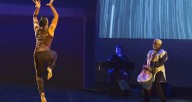As I write this, snow is falling on gardens still bursting with color and life and trees are just coming into the fullness of their vibrant fall foliage. The irony isn’t lost on the valiant struggle in the arts for some grasp of normalcy in a season that is about as far from normal as things get.
The chill comes early this year, and perhaps fittingly so, as we peer into a season fast closing in on more containment and a dark, uncertain winter.
Cerqua/Rivera Dance Theatre (CRDT)’s virtual fall benefit concert opened last night to an external backdrop of the paralyzing global pandemic, the hair-trigger tensions of our politically-polarized nation and the hold-your-breath-and-hope presidential election underway.
Inside the sheltering embrace of Studio5 Performing Arts Center in Evanston, however, CRDT’s 90-minute concert program put political divisiveness aside and unfolded in front of Simean Carpenter’s marvelous projections of trees, clouds, a tilted house, a reaching hand and shifting abstract designs.
Focusing on the emotional and physical fallout of issues the company has long been addressing—immigration, sexual identity and social justice—CRDT came as close to creating “normal” as virtual transmission could achieve. That’s not to say it was the same as, or even the equivalent of, a live performance, but valiant and life-affirming none-the-less.
Wearing a protective mask, as were all the dancers, artistic director Wilfredo Rivera introduced the evening’s program, “America/Americans,” consisting of revised excerpts from two previously-performed pieces: Rivera’s collaborative “American Catracho” (2019) and Monique Haley’s “ROOT” (2019), plus world premieres of two multi-section pieces by various company members: “Identity City, Part 1,” and “Mood Swing.” Then, as in a traditional theatrical setting, the lights dimmed and the performance began, all from the perspective of an audience seated in front of the stage.
While this single camera, single vantage-point approach approximated the in-person experience of an evening at the theatre, it couldn’t replicate the three-dimensionality of the human body. Nor could it transmit the nuances of expression, particularly breath, that infuse the magic across the footlights between performers and audience when we are all in the same room together, no matter how big the room. Perception of space and proximity are also distorted by the camera, as are the focal details and dimensionality that lighting brings to the artistic whole.
I suspect a good deal of expressive subtlety and nuanced qualities of breath, physical effort, gesture, interaction and movement design were also lost to the evenness of the camera’s steady eye and constant rhythm. The camera sees the big picture, but misses the details of subjective viewing.
COVID has heightened to an unimaginable degree just how much of a creative partner the living, breathing presence of individual audience members is to the collective experience of both performers and each other. The selective eye of each individual in the audience colors what we perceive and how we respond to what is happening on stage. That experience can’t begin to be replicated by a camera recording the event. On the other hand, innovative use of virtual performance techniques can, and has, begun to produce a whole new genre of dance online, something quite its own animal and worth developing further. That, however, is beside the point here.
While lamenting our loss of live, concert dance performances with the audience seated inside the theatre, we can still champion the efforts of dance companies like CRDT to persevere in whatever ways they can, sustaining us with their undaunted determination and faith to dance through what is shaping up to be a long and punishing siege.
So much for disclaimers! Leaving the virtual theatre, I listen back to my inner audience, as I always do after a performance, to what sticks with me.
The dancers look terrific, sleek, polished, well-rehearsed and committed. We are clearly in the hands of artists in complete and utter service to the mandates of the choreography and in partnership with each other. A palette of familiar modern dance lyricism, mixed with a smattering of jazz and Latin influences, offers no jarring deviations from the idiom, which contributes to both the solid strength of the four works as well as to some degree of stylistic sameness throughout the program.
Effective focus in all of these works is on the drama of life’s contradictions, conflicts and obstacles, as expressed through the alternating anguish of limbs at odds with each other, the push/pull of conflicting desires with the flowing exultations of expansive suspensions, luscious arching spines and crushing dives.
Highlights for me included Fernando Rodriguez’ heart-wrenching solo, choreographed by Noelle Kaiser, titled “First 200 Feet,” and excerpted from “American Catracho.” The solo segment is set to Rodriguez' derisive laughter and cries, juxtaposed across the tune of “Yankee Doodle.”
Equally compelling were the interactive segments that placed a musician on stage with one or more dancers. The combo of African drummer Paul Cotton and dancer Shelby Moran Amarantos in Monique Haley’s excerpt from “ROOT,” and the intense pairing of vocalist Margaret Murphy-Webb and dancer Simone Stevens in Haley’s “Culture Loop” segment of “Mood Swing” exemplify CRDT’s creative integration of the company’s musical artists as true performance partners and not just accompanists to the dancers.
The auditory environment under Joe Cerqua’s direction of CRDT’s live, on-stage musical ensemble, a special hallmark of CRDT, was palpable enough to make my dog howl—and came through as prominent, live and immediate. Unfortunately, sound was briefly cut off numerous times—a pitfall of virtual transmission—but it was worth the frustration to get past that glitch for an overall satisfying evening.
--
Cerqua Rivera Dance Theatre's fall concert series, "America/Americans" continues via livestream through Nov. 7. Tickets are $30-$50, available by clicking the event page below or visiting cerquarivera.org.


